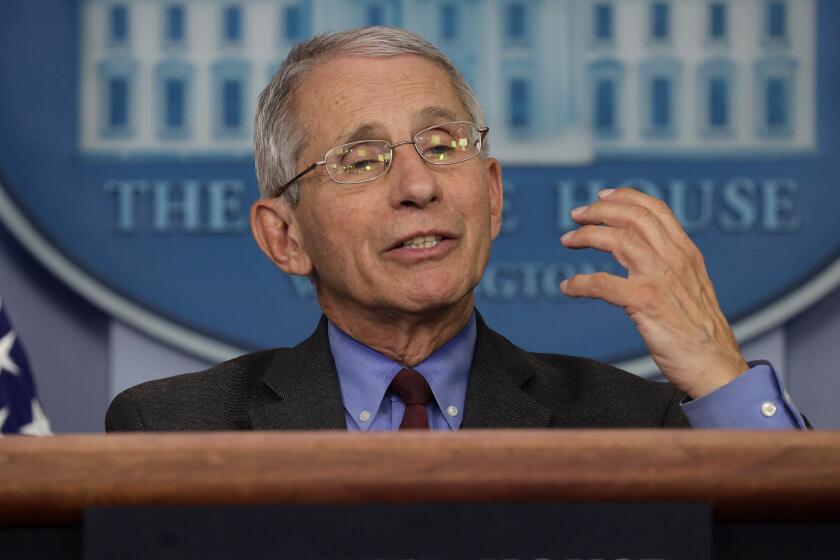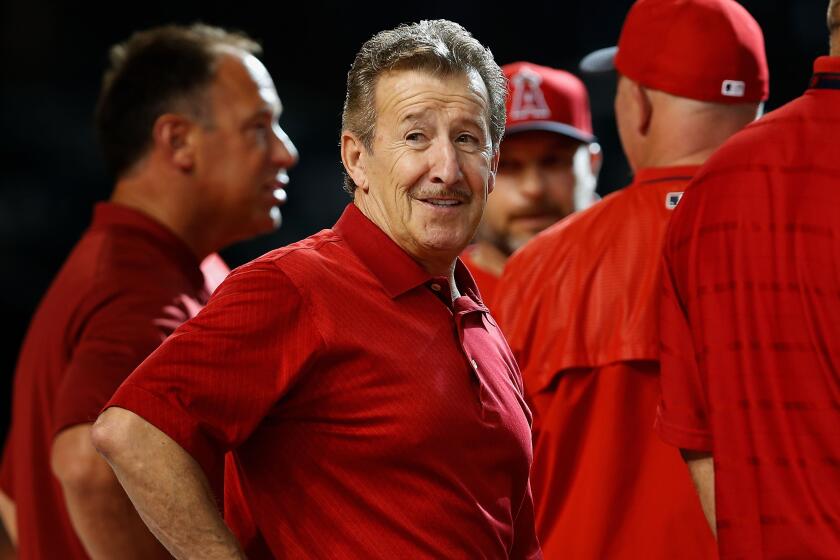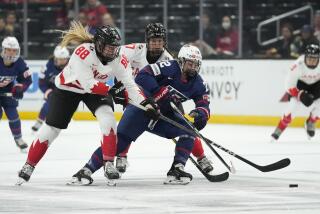Column: Hockey star Hayley Wickenheiser earns her biggest assist during COVID-19 pandemic
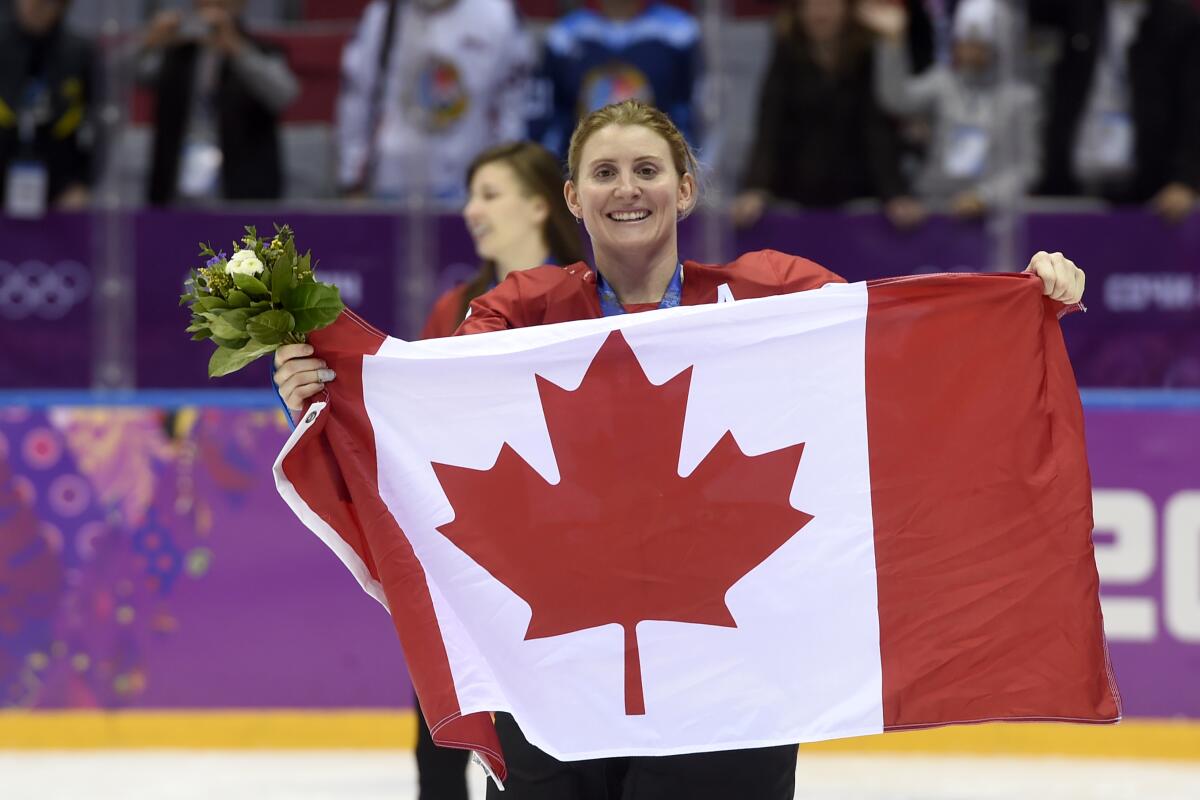
- Share via
The hands that once gripped a hockey stick so skillfully have a new and heroic purpose. Every time Hayley Wickenheiser collects cartons of masks, surgical gowns, face shields or hand sanitizer and brings them to front-line medical personnel battling the COVID-19 pandemic, she earns an assist more momentous than any point she scored during a brilliant career that took her from rural Saskatchewan to the Hockey Hall of Fame.
Wickenheiser, widely considered the best female player in hockey history, won four Olympic gold medals and one silver medal during a dominant run that spanned 23 years and included a rare Winter-Summer Olympic double after she made Canada’s softball roster for the 2000 Sydney Games. She retired in 2017 to pursue her dream of becoming an emergency room doctor and was elected to the Hall of Fame in 2019, her first year of eligibility.
When the pandemic hit, Wickenheiser was working in the emergency rooms of several hospitals in Toronto as part of her final year of medical school. The doctors training her were reassigned to treat COVID-19 patients; she wasn’t allowed to directly treat those patients but felt she couldn’t sit idle while colleagues in the trenches were running low on personal protective equipment.
“They pulled all the trainees out of hospitals about three weeks ago and redeployed us to do things like contact tracing and sourcing PPE and things like that,” she said, “because they need the attending doctors to focus on treating patients, not teaching, and also they don’t want to deplete supplies.”
Dr. Anthony Fauci says potential plans to play MLB games in locations away from fans is “better than nothing” during the coronavirus outbreak.
That inspired her to tweet a request for N95 masks, surgical masks, gloves and chemotherapy gowns and offer to pick them up herself in Toronto. Her voice and reach were amplified when Canadian actor Ryan Reynolds stepped up and offered videos and memorabilia to donors, triggering a blizzard of responses.
They’ve since teamed up with Conquer COVID-19, which unites Canadian physicians, business leaders and volunteers to get essential supplies to those in need. That means hospitals, shelters, clinics, long-term care facilities and group homes in Canada are getting PPE and such necessities as diapers and baby monitors.
“I knew as soon as Ryan Reynolds blew it up that it was going to be big, and knowing what I know from being in the front lines myself, that there’s such a shortage and this would really resonate with people,” Wickenheiser said. “I’m not surprised, but it’s been heartwarming to see just how many people have volunteered or given money or wanted to spread the message on social media.
“It’s been really a grassroots movement. And since we partnered with Conquer COVID-19 it’s really gone above and beyond anything that I thought it would, from the 40,000 or so items I asked for to well over a million items and now into millions of dollars raised.”
Her experience has changed her as an aspiring doctor, magnifying her respect for “those who toil away in labs all over the world trying to figure out vaccines and cures for disease.”
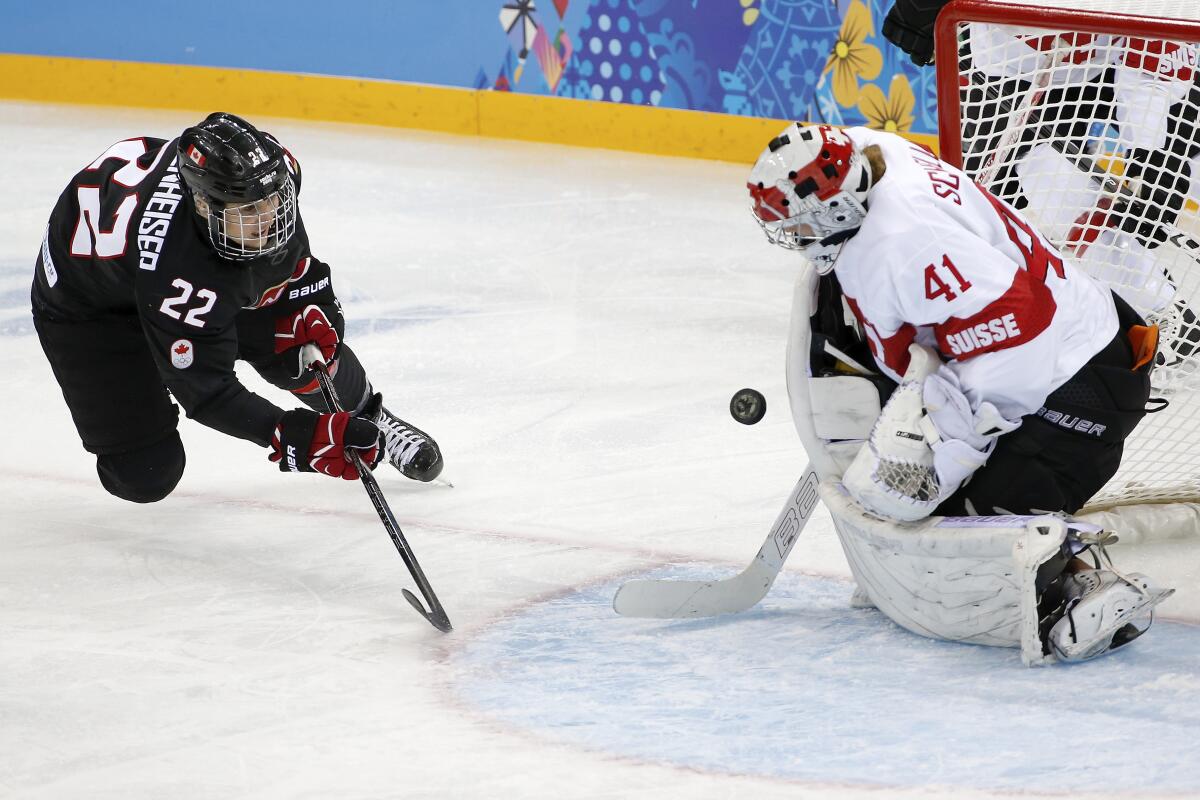
She has changed as a person, too. “It just reinforces why I went into medicine,” she said. “I’m not sure if this is the last pandemic that we’ll see in my lifetime. I’m sure there will be another one. But I think it reinforces, outside medicine, just how short life is. How uncertain it is. It forces everyone to slow down.
“It has forced us all, I think, to reevaluate what’s important moving forward. Also just how important being prepared is. I think it just highlights all the areas we forget about in life. But you’re grateful, also, for not having to live on the street or struggle through. Just an overall feeling of gratitude.”
Based on what she knows and has seen, she felt compelled to speak up when the International Olympic Committee hesitated to postpone the Tokyo Olympics. Wickenheiser, a member of the IOC’s Athletes’ Commission, said the organization’s initial refusal to delay the Games was “insensitive and irresponsible given the state of humanity.”
That didn’t go over well with out-of-touch IOC bigwigs, but she didn’t backtrack. Not long afterward, Canada said it wouldn’t send its athletes if the Games were held as scheduled. A few days later, the IOC pushed the Games back until the summer of 2021.
The Angels tell baseball operations employees, including manager Joe Maddon and GM Billy Eppler, they’ll be paid in full through the end of May.
Her experiences also led Wickenheiser to believe the NHL and other sports can’t finish their respective seasons.
“Not in the format that we know. Absolutely not, not given what I’ve seen and all of North America essentially is shut down right now,” said Wickenheiser, who has been an assistant director of player development for the Toronto Maple Leafs since 2018. “And if it comes back, I don’t know that it could be with 20,000 people in the stadium or 18,000. It’s an incubator for disease, really, for this virus. I’m not sure logistically how you could pull that off. Maybe playing in empty stadiums ... but in its current format, I cannot see that.”
Before the pandemic, a typical day meant she was on the ice with the Maple Leafs from 8 a.m. to 2 p.m. and worked an emergency room shift from 3 to midnight. “Now I’m kind of a keyboard warrior, doing a lot of things from home to try and keep this momentum going,” she said. But keyboard warriors can fight noble battles, too.
“Just like everyone else, I can’t wait for hockey to return, but to be honest it’s one of the last things I’m thinking about right now just because for hockey to return we need people to be safe and healthy,” she said. “Hockey and sport in general is something that can give people a lot of hope and joy when life can go back to normal. The one thing I’ve always appreciated about hockey in Canada is that it unites people like no other, so I can hardly wait for those rinks to be full again and for people to be enjoying a hockey game.”
More to Read
Go beyond the scoreboard
Get the latest on L.A.'s teams in the daily Sports Report newsletter.
You may occasionally receive promotional content from the Los Angeles Times.

